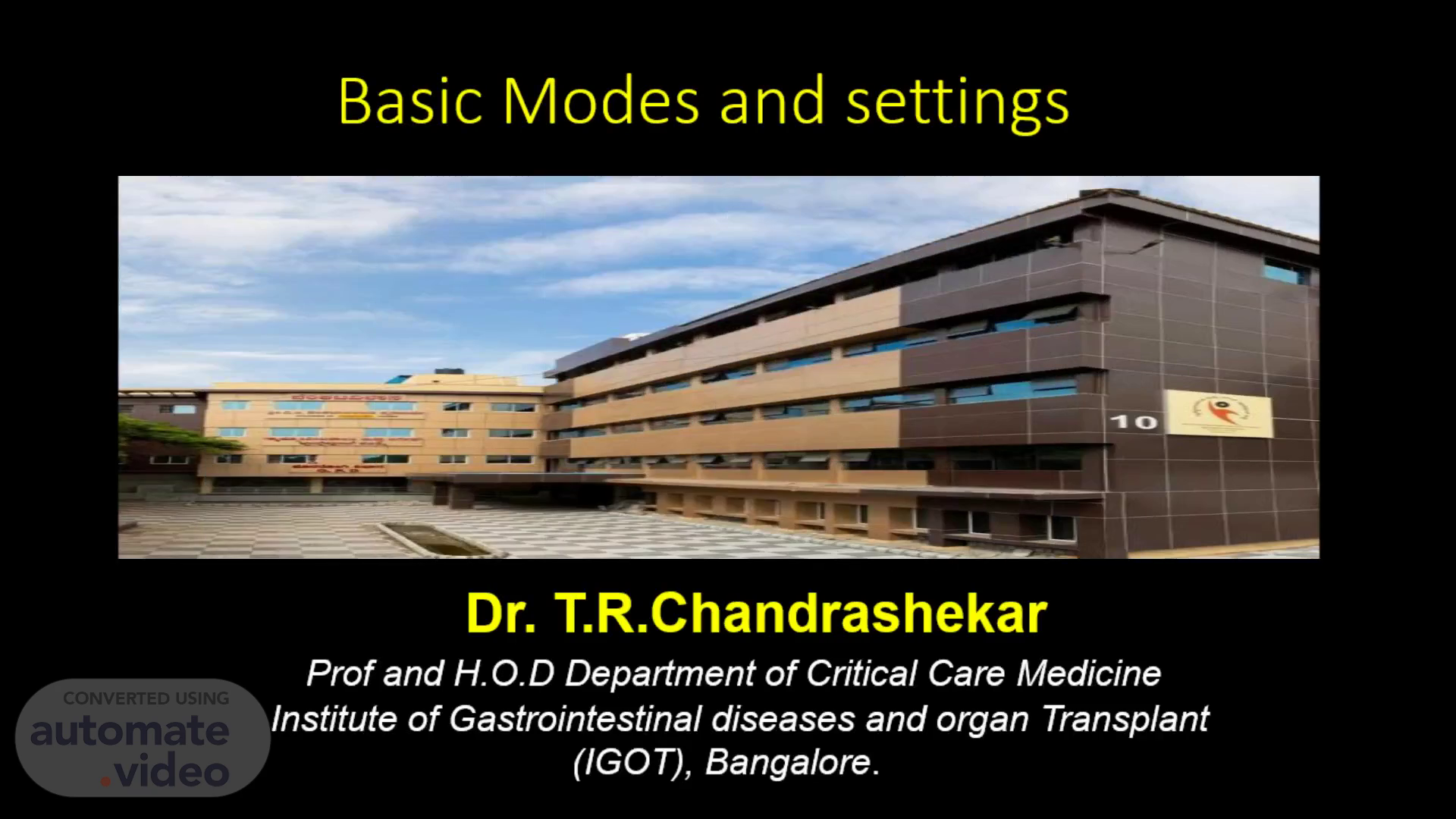
Page 1 (0s)
. . Dr. T.R.Chandrashekar Prof and H.O.D Department of Critical Care Medicine Institute of Gastrointestinal diseases and organ Transplant (IGOT), Bangalore ..
Page 2 (13s)
=. Resistance x Flow. +. Compliance. Patient effort.
Page 3 (36s)
NMB- controlled ventilation VC/PC. EXTUBATION IS RISKY BUSINESS. WHY THE CONCLUSION OF GENERAL ANESTHESIA CAN BE A CRITICAL EVENT - The anesthesia consultant.
Page 4 (1m 1s)
Physiology to understand Mechanical ventilation.
Page 5 (1m 7s)
Proportionality of support means support starts and ends and is as much as the Brain wants.
Page 6 (1m 43s)
VT-400ml. OP poisoning patient Day-4 stable, on PS mode.
Page 7 (2m 10s)
400ml. 20 cm H 2 0. Volume control Assist volume control.
Page 8 (2m 38s)
Set-point Adaptive Optimum Servo Intelligent. Targeting Scheme.
Page 9 (2m 58s)
350ml. 250ml. Volume support. Test breath. Target Vt 400ml.
Page 10 (3m 23s)
Inspiration. Ventilator generates a Inspiratory flow of gas.
Page 11 (3m 40s)
Flow occurs. Pressure difference. Flow for a given time = Tidal VOLUME delivered.
Page 12 (4m 10s)
Purpose of MV is to put volume into lung. For Volume to get into lungs- flow is required.
Page 13 (4m 29s)
Understanding Modes.
Page 14 (4m 35s)
1.First question is. Volume modes or Pressure modes.
Page 15 (4m 57s)
Flow is delivered till the set volume is achieved.
Page 16 (5m 14s)
Fixed Flow Patient may not be comfortable. Peak or Pplat or DP change depending on the alveolar stiffness.
Page 17 (5m 37s)
30cm H 2 0 Pplat. Should monitor pressure- Plateau pressure / DP.
Page 18 (5m 59s)
Control variables within breaths. Who triggers inspiration? What limits inspiration? What cycles inspiration to expiration?.
Page 19 (6m 7s)
1-Who initiates?. Phases of Inspiration. gal_w_accys - 01 - 15hx305dpi.
Page 20 (6m 33s)
T:\Brunner\patient.tif. How does the ventilator start a breath? If patient is not capable to initiate a breath Or not allowed to initiate a breath.
Page 21 (6m 54s)
Time. Patient. Pressure trigger. Trigger – Initiation of Inspiratory flow from the ventilator.
Page 22 (7m 14s)
Pressure Triggering. Time (sec). Assisted. Controlled.
Page 23 (7m 32s)
Improper trigger setting is responsible for >50% asynchrony.
Page 24 (7m 52s)
3. When is inspiration ended allowing for expiration to start ? (CYCLE VARIABLE).
Page 25 (8m 7s)
Time cycled. Pressure controlled. Preset V T Volume Cycling.
Page 26 (8m 23s)
Flow Cycling. Peak flow. 75. 50. 25. 100L. Inspiration.
Page 27 (8m 43s)
DIFFERENT TYPES OF BREATHS depending upon the above three questions.
Page 28 (9m 1s)
T. L. C. All three stages controlled by machine. T.
Page 29 (9m 22s)
PIP. FIO 2 I:E VC/AVC Mode VT 7ml/kg PEEP RR 50% 450ml 6 cmH 2 O 18/min 1:2 DP 8 Insp Hold Cs 56.25 Pplat 14.
Page 30 (9m 51s)
Controlled Mode (Volume-Targeted Ventilation). DR TRC/KRH.
Page 31 (10m 9s)
Pressure Flow Volume (L/min) (cm H 2 O) (ml). Set PC level.
Page 32 (10m 26s)
Pplat. How set Pressure limit when shifting from Volume limited modes.
Page 33 (10m 42s)
Pressure support mode. You can not set RR Tidal volume= altering PS levels I:E ratio Instead we can change Rise time and Expiratory sensitivity to alter them.
Page 34 (10m 54s)
Expiratory trigger sensitivity. Rise time To increase flow.
Page 35 (11m 11s)
Basic More Apnea TRC Patient I:E: 128 TE: 2.75S VVIBW: 8.0 ml/kg 7 cmH20 70 p- ramp 25 1.00 5.0 b' min Flow trigger 16 530 5 cmH20 PEEP/CPAP 50 O xygen Cqntrols.
Page 36 (11m 25s)
Change from inspiration to expiration phase. Types of cycling?.
Page 37 (11m 57s)
RR and I:E ratio is controlled by whom?. RR ,I:E ratio Are controlled by the patient.
Page 38 (12m 19s)
Flow Cycling. 75. 50. PF=100%. 25. Inspiration. Expiration.
Page 39 (12m 36s)
RISE TIME. 40. P CIRC cmH 2 O. INSP. L min. EXP. 30.
Page 40 (12m 48s)
PEAK FLOW. Peak Flow 30l/mt. Peak Flow 90 l/mt. Missed breaths.
Page 41 (12m 57s)
Time (sec). Flow (L/m). Flow Cycling. Pressure (cm H 2 O).
Page 42 (13m 41s)
SIMV=VC+PS. Breathing sequence - Whether or not the mode allows mandatory, spontaneous breaths or both.
Page 43 (13m 50s)
SIMV. Give rest to respiratory muscles during mandatory breath= decreased WOB Has back up rate, so when starting to wean you feel it much safer.
Page 44 (14m 4s)
Time (sec). DR TRC/KRH. Time-Cycled. Flow-Cycled.
Page 45 (14m 30s)
Mandatory breath Spontaneo b reaths Flow (L/min) Volume 30 Airway pressure (a-n H 20) Esophageal pressure (cm H 20) Figure 15-10 S',mchronized intermittent mandatory ventilation. Note that the esophageal pressure change for the mandatory breath is nearly as great as that for the spontaneous breaths..
Page 46 (14m 44s)
Flow (L/min) Time. SIMV+PS. Asynchrony Diaphragmatic injury.
Page 47 (15m 9s)
PC with PEEP I:E=1:1 With spontaneous breathing at both levels.
Page 48 (15m 29s)
Settings that the clinician selects. The alarms that place limits on the process.
Page 49 (15m 48s)
Tidal volume 6 to 8ml/Kg. PEEP 5cm H2O Personalize.
Page 50 (16m 18s)
Same tidal volume. 2. PEEP =5 cm H2O. Can be personalized looking at Pplat and driving pressure.